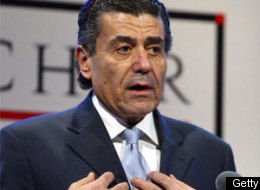Haim Saban, the billionaire entertainment magnate and longtime Clinton supporter, denied the allegation. But four independent sources said that just before the North Carolina and Indiana primaries, Saban called YDA President David Hardt and offered what was perceived as a lucrative proposal: $1 million would be made available for the group if Hardt and the organization's other uncommitted superdelegate backed Clinton.
Contacted about the report, Saban, initially very friendly, became curt. "Not true," he said, "it's simply not true." He declined to elaborate. Did he talk to the YDA superdelegate? "I talk to many, many superdelegates. Some I don't even remember their names." Did he propose any financial transaction? "I have never offered them or anybody any money" in exchange for support or a vote, he said. The Clinton campaign did not return a request for comment.
Members of the Young Democrats agonized about the potential fallout of Saban's call; his financial offer represented one-third of the group's 2008 budget. Democratic officials and fundraisers were consulted about how to respond, and at times the discussions were "emotional," one participant said. "It is scary for them, Haim is very powerful, he has great influence over donors who give to them."
Another source said that Hardt and others were acutely aware of Saban's status within Democratic circles and were concerned that their organization would suffer long-term harm if they declined his offer or if news of the proposal became public.
"I said I thought that the appropriate response was to call Haim back and say thank you but we are not interested," said the source. "I also said that it was surely the case that this story would get out because it is too interesting not to and they should think about how to deal with it. It was a day or two [before they responded]. They felt afraid. They were like, 'Holy shit, this is Haim Saban.'"
Nevertheless, the group declined the overture. A YDA official cited moral reservations as well as the overwhelming consensus of its members to back Sen. Barack Obama.
The group had not directly solicited Saban's financial support prior to the call, the official said, and records show no money from Saban has been given since. He did donate $15,000 to the group's 2005 convention, a separate political entity, and is a natural benefactor for groups such as YDA, a 527 which describes itself as the "largest youth-led, national, partisan political organization."
Saban is the nation's largest political campaign contributor over the last decade, FEC records show, giving nearly $13 million since 1999 to dozens of candidates, PACs, and Democratic campaign committees.
This past week, Crystal Strait, a YDA superdelegate, publicly announced she was supporting Obama. Another YDA superdelegate from Puerto Rico, Francisco J. Domenech, endorsed Clinton several months ago. Hardt, the third superdelegate, remains uncommitted.
"Crystal made an independent decision for all the reasons that she stated and David has consistently stated his position of choosing who to support after the primary is done," Alexandra Acker, the executive director of YDA, said when asked about why the two individuals made their respective decisions.
Hardt also released a statement explaining his current neutrality: "With just five contests left, I will wait to declare my superdelegate vote until every young voter has made their voice heard. The Young Democrats of America will proudly unite behind our nominee." Strait did not respond to repeated requests for comment.
Saban's offer, which was hinted at last week by John Aravosis, publisher of AmericaBlog, underscores the heightened pitch of the Democratic primary.
Those familiar with campaign finance rules say that monetary promises for superdelegates are "problematic," but may not, in the end, be legally out of bounds.
"This is not an FEC issue," said Jan Baran, a Republican campaign finance attorney. "There are federal and state laws that bar 'vote buying' but I'm not sure they apply in this situation since this involves a convention delegate and not a voter in an election. In short, I don't know whether this is illegal or just hardnosed political horse-trading."
While no other accounts of direct financial offers have surfaced, both Democratic campaigns have attempted to use the power of the check to recruit the support of influential party insiders.
In March, high-ranking donors for Sen. Clinton, including Saban, sent a letter to House Speaker Nancy Pelosi chastising her for suggesting that superdelegates had a responsibility to support the candidate who finished the primary process leading in the pledged delegate count.
"We have been strong supporters of the DCCC," they wrote. "We therefore urge you to clarify your position on super-delegates and reflect in your comments a more open view to the optional independent actions of each of the delegates at the National Convention in August."
And in February, the Center for Responsive Politics reported that Sen. Obama's political action committee had given $694,000 to superdelegates in the previous three years. Of the 81 who had announced their support for Obama at the time, 34 had received donations totaling $228,000.
Nico Pitney is National Editor at the Huffington Post. He was previously Deputy Research Director at the Center for American Progress and Managing Editor of ThinkProgress. He lives in Washington, DC, and has appeared on CNN, MSNBC, NPR, and the BBC. Nico can be reached at pitney@huffingtonpost.com.
Sam Stein is a Political Reporter at the Huffington Post, based in Washington, D.C. Previously he has worked for Newsweek magazine, the New York Daily News and the investigative journalism group Center for Public Integrity. He has a masters from the Columbia University Graduate School of Journalism and is a graduate of Dartmouth College. Sam can be reached at stein@huffingtonpost.com.
























No comments:
Post a Comment